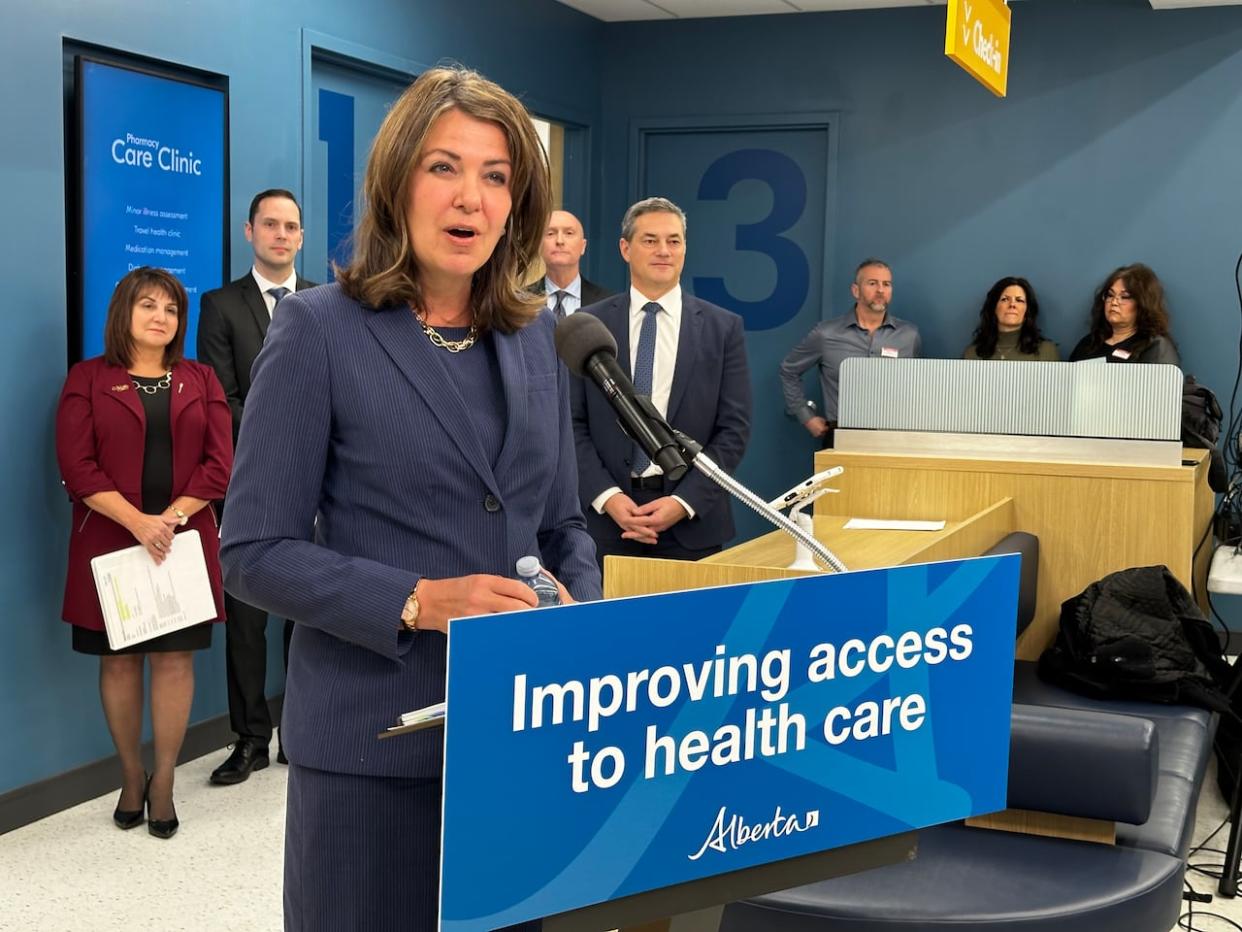Alberta government promotes 'pharmacy clinics' to take strain off family doctors, ERs

The Alberta government is touting an expansion of private pharmacy clinics across the province as a significant relief valve for family doctors and emergency rooms under strain.
"There is an urgent need to find fixes and deliver accessible care fast and efficiently," Premier Danielle Smith said at a news conference at a northeast Edmonton pharmacy on Thursday morning. "One answer is to make better use of all health professionals' time and talent, and now we have more ways to do that."
Shoppers' Drug Mart president Jeff Leger said Thursday the chain will renovate its stores across the province and add nine new shops to create 103 pharmacy care clinics by the end of 2024.
Leger said the $77-million investment in the clinics will help backstop the provincial care system and give Albertans more access to primary health care.
However, the organization that regulates Alberta pharmacists says the clinics are nothing new.
"Shoppers Drug Mart has chosen to label portions of some of their pharmacies as 'pharmacy care clinics' to create awareness about these services. The services offered in 'pharmacy care clinics' are already available in most pharmacies," Alberta College of Pharmacy spokesperson Barry Strader said in an email Thursday.
Alberta pharmacists have the broadest scope of practice of the professionals across the country. They've been able to prescribe medication and administer injections since 2007.
Strader said about 60 per cent of pharmacists are authorized to prescribe the higher-risk medications kept behind pharmacy counters.
He said the newly branded clinics may create more awareness about the services pharmacists offer, and increase demand, but may not lead to more pharmacists working in Alberta.
Pharmacists can also assess patients for minor illnesses and ailments and prescribe treatments when appropriate.
According to the Shoppers Drug Mart website, patients can visit their stores across Alberta for assessment of allergic rhinitis, bladder infections, pinkeye, to get birth control pills and morning-after pills, diagnose ringworm, heartburn, and more. Alberta Health reimburses pharmacists for the cost.
The first Alberta Shoppers store to brand itself as a pharmacy clinic was in Lethbridge in 2022, and the company introduced the clinics last year to a handful of Ontario stores.
Other Alberta pharmacies already included clinic features before Shoppers tested the model.
Shoppers' parent company, Loblaws, did not immediately answer a question on Thursday about how many of its Alberta pharmacies are currently branded as clinics.
Minister of Jobs, Economy and Trade Matt Jones said at the news conference the service would expand to 44 new locations.
In October, the college of pharmacy issued a statement saying that any pharmacy identifying itself as a clinic must be clear the service is staffed by pharmacists and not doctors or other health-care workers.
"Pharmacies and regulated members must not engage in advertising that is untruthful, inaccurate, or otherwise capable of misleading or misinforming the public," the notice said.
Pharmacists don't replace doctors, say critics
Critics, including some doctors, are troubled to see the government touting pharmacies as an alternative to medical care.
"Pharmacists are not physicians," said Dr. Jon Meddings, a University of Calgary professor of medicine, gastroenterologist, and past dean of the Cummings School of Medicine. "This is just a disaster waiting to happen."

Dr. Jon Meddings, a University of Calgary professor of medicine and past dean of the Cumming School of Medicine, says directing patients to pharmacists when they need medical care comes with some risks. (Submitted by the University of Calgary)
Doctors receive training in how to take a patient's history, confirm a diagnosis, and ensure they don't miss signs of a serious health problem. Meddings said pharmacists don't receive that training, or know how to do a physical exam.
He worries that a patient who goes to a pharmacy with suspected indigestion, for example, might lose valuable time when they should have gone to the emergency room to be screened for a heart attack.
Meddings said pharmacists are also in an inherent conflict of interest by having the ability to both prescribe and sell medications — something doctors are not allowed to do.
Dr. Paul Parks, president of the Alberta Medical Association, said in a statement that growing access to pharmacists does nothing to change his "extreme concern about what's happening with patient access to comprehensive lifelong care."
The association released survey results earlier this week suggesting more than 60 per cent of Alberta family doctors are considering early retirement or leaving Alberta. More than 90 per cent of family and rural doctors said they are worried about the financial health of their practices.
Parks said the government needs to act faster to keep family doctors' clinics open and viable.
Chris Gallaway, executive director of Friends of Medicare, says patients are best served by primary health clinics, which can direct them to the right health professional.
As corporations step in to capitalize on gaps in the public health-care system, Gallaway worries pharmacies may try to sell patients other products while they seek medical care.
"People don't always know what is covered or isn't or what fees should or shouldn't exist," he said.
Health Minister Adriana LaGrange said at the news conference the government is working to recruit and train more health-care workers and reach new funding arrangements with family doctors to stabilize their practices.

